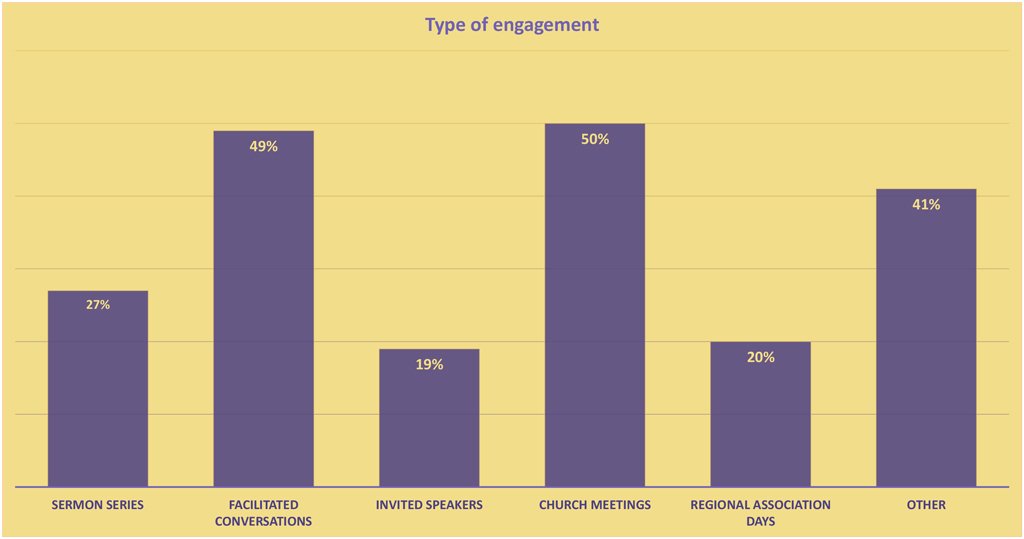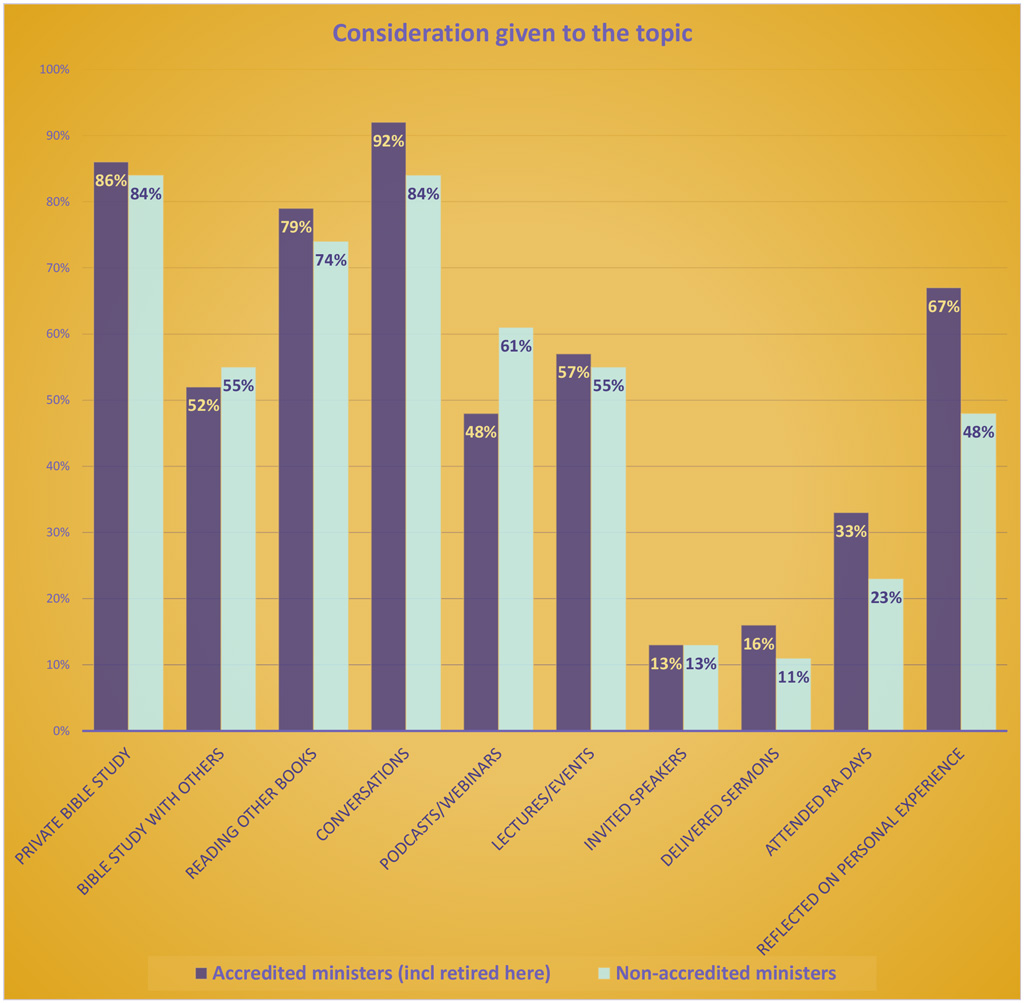Chapter 7: Resources for engaging with matters relating to human sexuality
Contents of this page:
In the church and ministers’ surveys, respondents were asked questions about engaging with matters of human sexuality as a church or personally (for ministers).
Please note, we are only including in this chapter the resources mentioned most frequently in the survey responses. For a fuller
list of resources mentioned in the churches’ and ministers’ surveys, see the Appendices.
Churches
The church survey included questions about engaging with matters relating to human sexuality. Churches were asked:
‘How has your church engaged with matters relating to human sexuality in the last five years?’
Over half the churches who responded to this question had engaged with topics relating to human sexuality in some way, in the last five years (57%). These are some of the ways they had done this.
 How congregations had engaged
How congregations had engaged
Of the churches who responded to this question (42%), the most significant reason churches gave for not having engaged was ‘There are more important things to be concerned about’ (34%), ‘It would be pastorally unhelpful at this time’ (33%) and ‘We have a clear position on these matters’ (30%). Churches were also asked:
‘How likely are you to engage with this in the next two years?' 30% responded ‘not at all’ and 25% responded ‘definitely’.
Churches were also asked:
‘Alongside the Bible are there any resources you found particularly helpful?’ 48% of churches did not respond to this question. This may be because they believe the Bible is sufficient or they are unaware of other resources that they could mention. There may be other reasons why they did not answer this question.
Other resources that were mentioned most frequently include:
-
‘Living Out’, including their website, resources from Stephen Elmes and literature by Ed Shaw,
-
‘Living in Love and Faith’, including the books, website and other resources
-
‘Affirmative’, by Jonathan Tallon and the accompanying online materials,
-
‘Is God Anti-Gay?’, by Sam Allberry, and other books by this author.
A few respondents mentioned conversation with others, particularly hearing about the experiences of LGBTIQA+ people.
The church survey asked respondents:
‘What style of resource would you find helpful?’ 83% of respondents did not answer this question. This is perhaps not surprising when we note the number of churches who said they would definitely engage with matters relating to human sexuality in the next 2 years is 25% (see above).
25% of those who responded to this question took the opportunity to say that the Bible was a sufficient resource. Others principally asked for videos, usually to enable discussion. In some answers, the request was for videos that would articulate a specific view on matters relating to human sexuality. Others requested videos that would enable greater understanding about different ways to read the Bible or to hear personal stories from LGBTIQA+ people. Perhaps best articulated in these two quotes:
"We would appreciate any links to articles, videos, blogs, webinars, websites, etc that help to understand the issues facing Christians and churches about same-sex attraction. Also anything that would help a church and its members appreciate the different biblical perspectives that Christians hold and the basis for them.” (Church)
“Material that clearly sets out how people can hold to a variety of views. Last time round we found worked practical examples were useful.” (Church)
Return to top of page
Ministers
The ministers’ survey also included questions about engaging with matters relating to human sexuality. Ministers were asked:
‘Which of these have you done to engage with matters relating to human sexuality?'
The vast majority of ministers who responded had engaged in conversation (92%) and/or private Bible study (86%) and/or read books, as well as the Bible (79%). Over half had reflected on personal experience (68%) and/or attended lectures or events (57%) and/or taken part in Bible study with others (52%).
 Who had done what?
Who had done what?
Ministers were asked:
‘Alongside the Bible, are there resources you found particularly helpful?’ 58% of ministers responded to this question. It is not possible from the data to determine why 42% did not respond to this question with suggestions.
Here are some of the resources, in order of how often they were mentioned:
-
Books by Stephen Elmes, including: ‘A Beautiful Endeavour’, ‘Sexuality, Faith and the Art of Conversation’, plus online resources,
-
Books by Ed Shaw, including: ‘The Plausibility Problem’ and ‘Purposeful Sexuality’,
-
Living Out resources and website,
-
Books by Preston Sprinkle,
-
Books by David Gushee, including ‘Changing our Minds’,
-
‘Is God Anti Gay?’ by Sam Allberry,
-
‘War of Loves’ by David Bennett,
-
‘Two Views of Homosexuality, the Bible and the Church’ by Loader, De Franza, Hill and Holmes,
-
Evangelical Alliance resources
Ministers also mentioned as important, conversation with colleagues and with people who are LGBTIQA+, including listening to the stories and experiences of people who identify as LGBTIQA+.
Ministers were also asked:
‘What type or style of resources would you find helpful?' 48% of ministers responded to this question, many ministers mentioned videos, conversations and podcasts. Some ministers said that they would find videos about disagreeing well helpful. Some ministers talked about the value of listening, mentioning: “short video explanations about faith and practice of faith from a range of LGBTIQA+ Christians”. Some ministers referred to videos “outlining the different viewpoints on biblical teaching around same-sex relationship” as a resource for them personally, but also for their churches. Ministers talked about materials that enabled reflection and exploration. Here are some comments from ministers about the type and style of resources they might find helpful:
“List of key questions people are asking. Alternative interpretations of each of the key scripture passages being used. It is important that two people may read the same scripture passages yet see different things in them. It helps us understand one another and respect the view of the other as ‘also scriptural’.“ (Minister)
“Good quality short (up to 15 mins) video clips from across the Baptist Church family which reflect the fullest range of theological views on SSM as possible” (Minister)
“Robust theological argument stating where we have been historically, followed by a clear explanation of how different folk have theologically journeyed either to a new point of view or remaining at the historical position. Not just testimonies of personal hurt or opinion (significant though these are).” (Minister)
“… the real challenge that I find is how to explore these issues with my church who are not academic and are unlikely to come to special sessions to explore the issue.” (Minister)
“Testimony and broader theological engagement, dealing with the thrust of the biblical narrative, rather than focusing on a small group of tough texts.” (Minister)
“Personal testimony with clear, prayerfully thought out theological/Biblical standpoint of all the possible views around human sexuality and gender.” (Minister)
Return to top of page
Regional Ministers
Having had the opportunity in the ministers’ survey to respond to these questions personally, Regional Ministers were also asked:
‘How have you engaged with matters relating to human sexuality within your Association?’ Almost all the Regional Ministers responded to this question. They mentioned the following:
-
Fresh Streams Theology School was the most mentioned resource (50%)
-
‘Kind and Gentle’ was the next most mentioned resource (30%)
-
offering teaching and reflection days (20%)
Some other things Associations have done: listening days and/or providing listening spaces; personal one-to-one conversations with ministers; offering models for having difficult conversations and/or facilitation skills for enabling congregations to talk about human sexuality.
Regional Ministers were also asked:
‘What particularly helpful resources are known to you that you can offer/commend to other Associations?’ A large majority of Regional Ministers responded to this question (83%), Here are the resources that were mentioned the most:
-
Fresh Streams Theology School,
-
Steve Elmes books,
-
The BUGB Website,
-
Books by Jonathan Tallon, including ‘Affirmative’ and ‘The Bible and Homosexuality’,
-
Living Out,
-
Kind and Gentle Spaces.
Some Regional Ministers spoke of gathering ministers together for conversations; they also spoke of valuing hearing stories from LGBTIQA+ Christians and having healthy conversations regarding difference.
Finally, Regional Ministers were asked:
‘What type or style of resources would you find helpful to engage with matters relating to human sexuality with your Association?’ The majority of Regional Ministers responded to this question (72%). It is important to notice that some Regional Minister affirmed the resources they already have, presumably many of which they had mentioned. Further suggestions included resources that lay out the Biblical and theological arguments about different views; digital resources such as video; conversations and dialogue.
Here are some comments that help to give an indication of what might be valued:
“It has to be authentic voices from those who have struggled with sexuality and found their way to a particular place of understanding, whatever that is.”
“A range of materials to help people see how others have come to their conclusions.”
Please see the Appendices for
fuller lists of the resources mentioned in the surveys.
Return to top of page